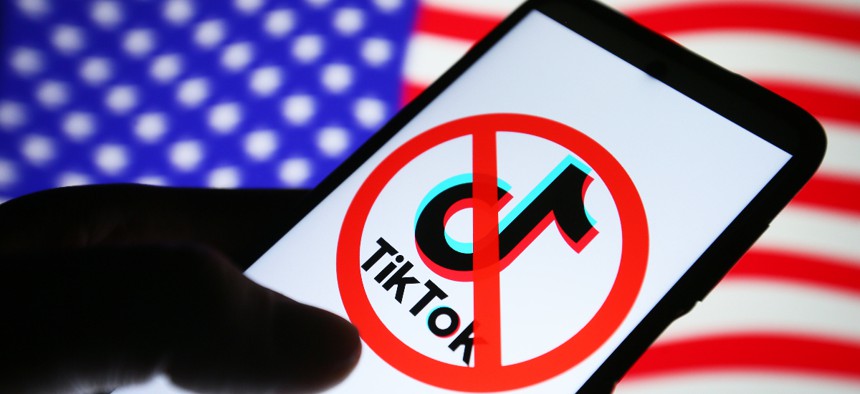GOP Lawmakers Call for Congressional Ban on Members Using TikTok

Pavlo Gonchar/SOPA Images/LightRocket via Getty Images
A coalition of 17 House and Senate GOP lawmakers called for an amendment to both chambers’ rules to bar members of Congress from using TikTok for official purposes.
A bicameral group of Republican lawmakers on Monday called for key House and Senate committees to take action to prevent lawmakers from using TikTok for government-related purposes, citing privacy and national security concerns about the popular app’s ties to the Chinese government.
In a letter to the leaders of the Senate Rules Committee and the House Administration Committee, 17 Republican lawmakers—led by Sen. Thom Tillis, R-N.C., and Rep. Dan Crenshaw, R-Texas—called for Congress to “lead by example and immediately stop using the platform for official communications.”
Citing “recent revelations” from last month’s House Energy and Commerce Committee hearing featuring TikTok CEO Shou Zi Chew—in which lawmakers grilled the video app’s top executive about privacy concerns and TikTok’s impact on children’s mental health—the letter’s signatories urged the chairs and ranking members of the two committees “to amend the House and Senate rules to bar members of Congress from continued use of TikTok and take any other appropriate measures to mitigate the risks of this de-facto, spyware app.”
As the lawmakers noted, both the Senate’s chief information officer and the House’s chief administrative officer previously warned members of Congress about the cyber risks posed by the app.
“It is troublesome that some members continue to disregard these clear warnings and are even encouraging their constituents to use TikTok to interface with their elected representatives—especially since some of these users are minors,” the letter said. “We feel this situation warrants further action to protect the privacy of both sensitive congressional information and the personal information of our constituents.”
Concerns about TikTok—which is owned by the Chinese company ByteDance—have spread across the federal government in recent years, with national intelligence officials and federal regulators increasingly warning that TikTok users’ data—such as their locations, browsing histories and biometric information—could be shared with Beijing’s authoritarian government.
Congress voted last year to ban TikTok from all government devices, and the Office of Management and Budget announced in February that federal agencies had 30 days to remove the app from all official systems. Last month, the Biden administration also reportedly threatened to impose a national ban on TikTok unless ByteDance divests ownership of the app.
Lawmakers have already introduced a variety of bills in recent months that would either impose an outright ban on the app, or give the Biden administration enhanced authority to restrict TikTok and other technologies developed in China. Legislation introduced last month by Sens. Mark Warner, D-Va.—the chair of the Senate Intelligence Committee—and John Thune, R-S.D.—the Senate minority whip—would give the Commerce Department the authority to take action against apps, like TikTok, that are based in countries determined to be “foreign adversaries.”
Another bill, introduced in February by House Foreign Affairs Committee Chair Michael McCaul, R-Texas, would give the White House the authority to ban any app that threatens national security. That bill passed McCaul’s committee last month without any Democratic support.
More than 30 states have already banned TikTok from government-issued devices, and the U.S. armed forces previously prohibited the app from being downloaded onto military devices. Legislators in Montana last week also approved legislation that would ban TikTok from operating in the state—which, if signed into law, would make it the first statewide ban of the app.
A growing number of countries, including Australia and Canada, have also banned the app from government-issued devices, and the European Parliament, European Commission and European Council have announced similar bans over security concerns.






